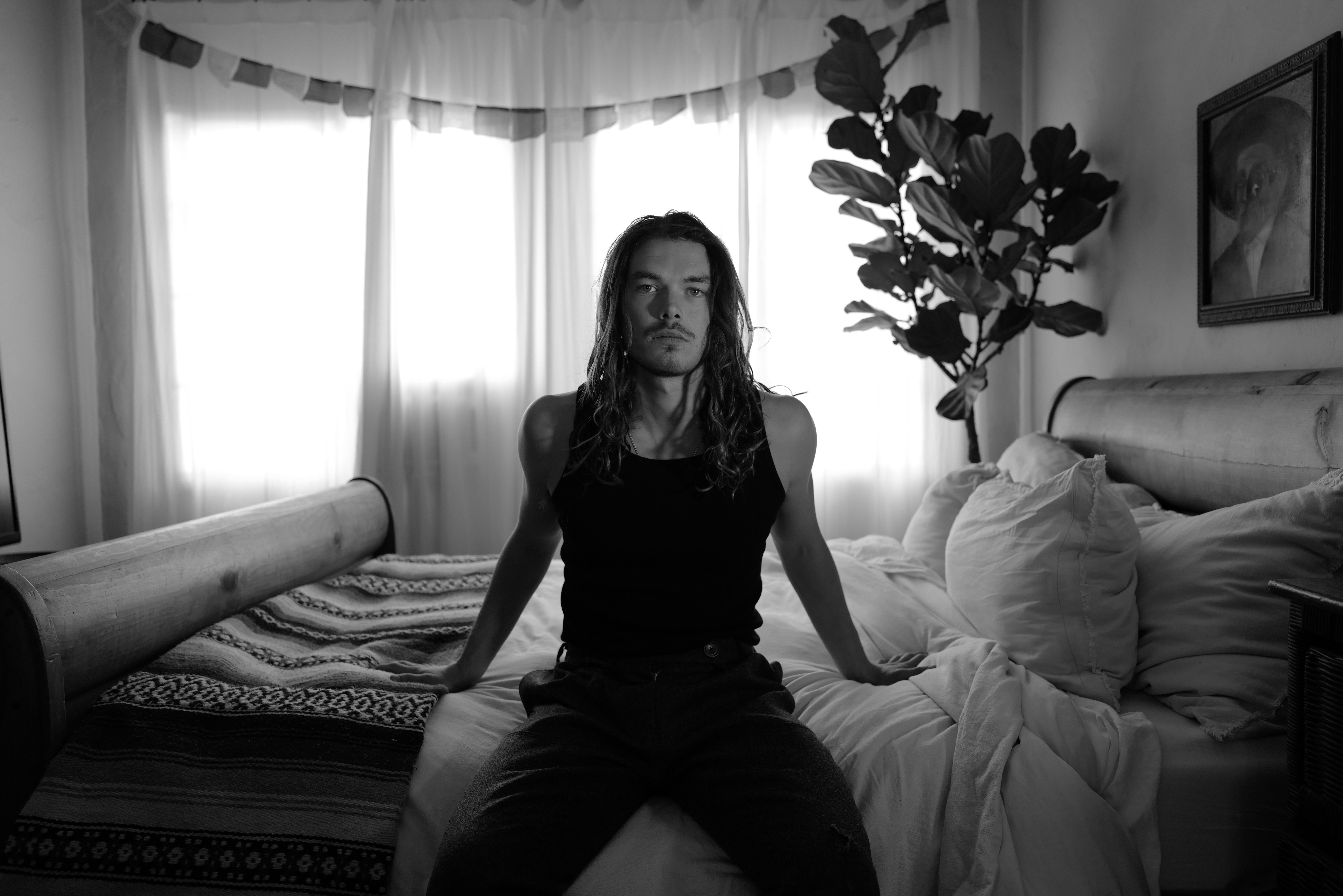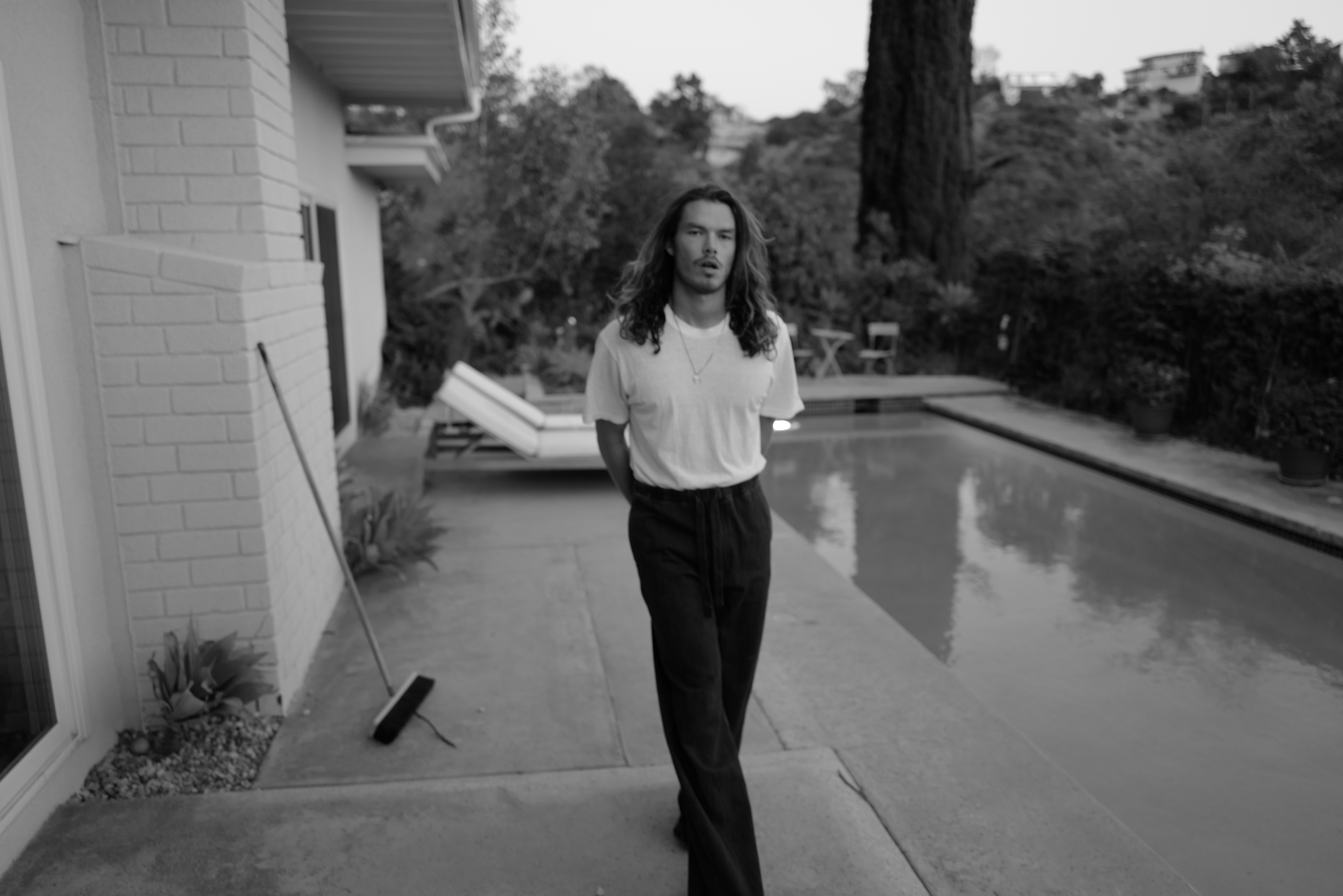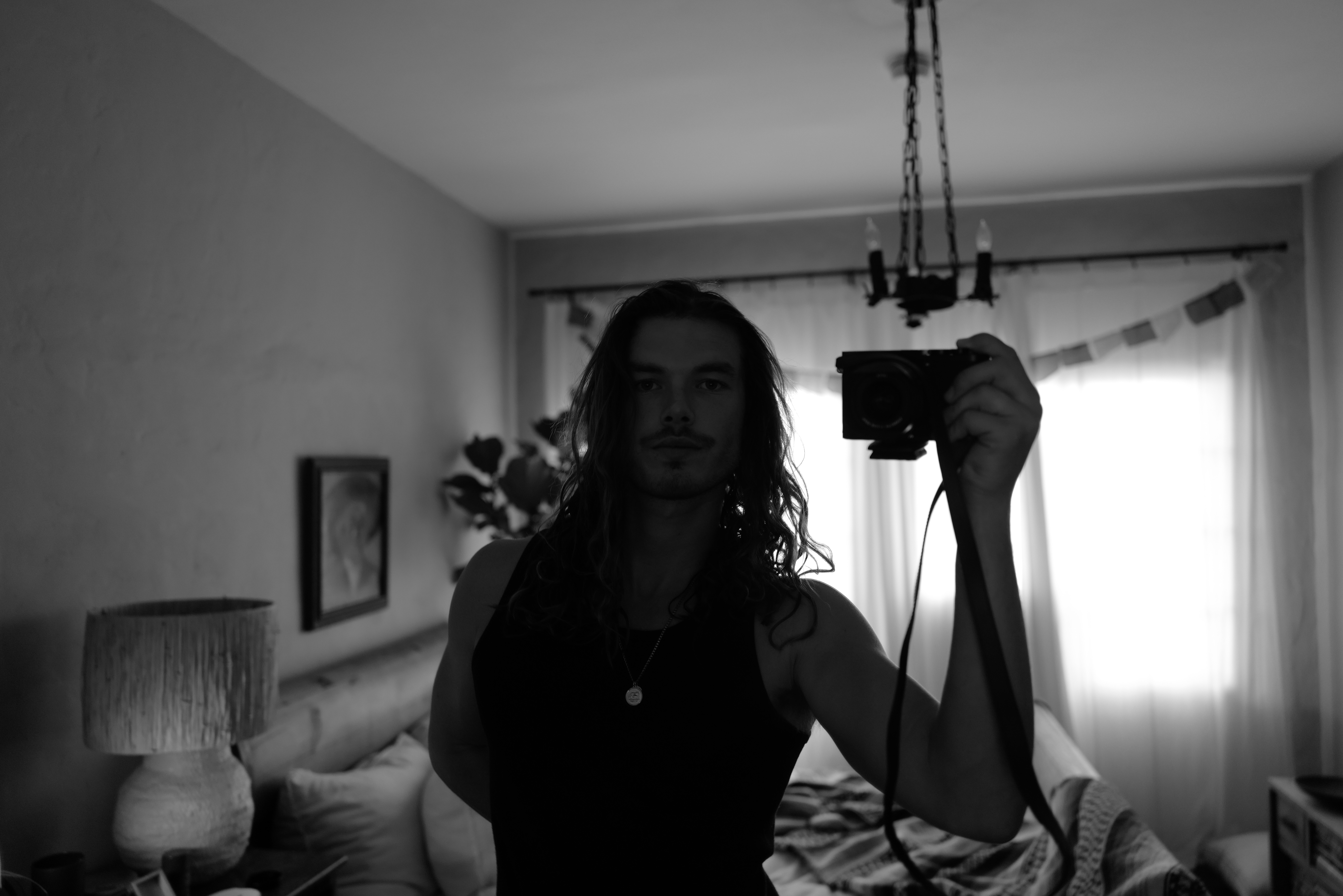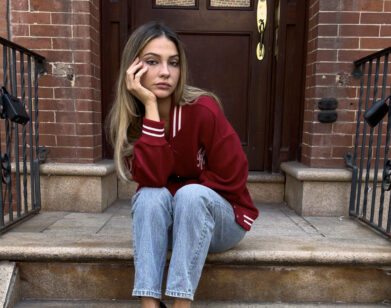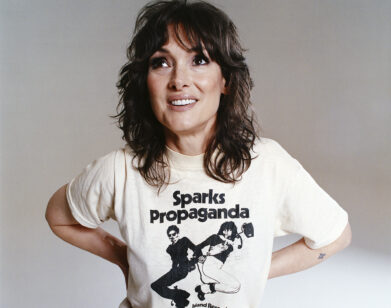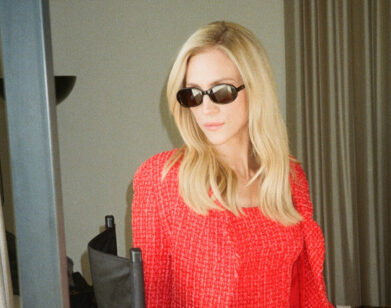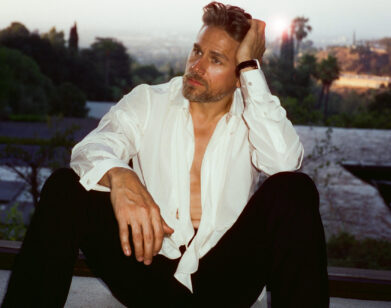Film!
Sam Corlett and Jacob Elordi Take A Deep Breath
Jacob Elordi and Sam Corlett have a lot in common. The friends and actors, both of the Australian persuasion, got their start playing irresistible, floppy-haired tempters in Netflix originals. Elordi’s debut as the unattainable Noah Flynn in the platform’s Kissing Booth trilogy solidified his heartthrob status, a perception he went on to deepen and complicate as the sinister and enigmatic Nate Jacobs on HBO’s Euphoria. Corlett, for his part, landed his first major role as the mischievous, often-shirtless prince from hell on Chilling Adventures of Sabrina, establishing himself as a smoldering, roguish love interest before pursuing more ambitious fare. Now, Corlett stars as Leif Eriksson in Vikings: Valhalla, Netflix’s sequel to the cult classic historical drama Vikings. Corlett’s turn in the series marks his first lead role, as an intrepid Norse explorer who embarks on a vengeance-fueled quest across Early Middle Ages Europe. Just a few weeks since the series’ premiere, Netflix has already greenlit a second season, meaning that Corlett will need to gear up to greet the whirlwind of press, travel, and long stretches in isolated locations once again. Luckily, as he tells his friend Elordi, he knows how to meditate. Below, the pair made time for a chat about their shared love for Heath Ledger, the importance of deep breathing, and seeing your face on a billboard for the first time.
———
SAM CORLETT: G’day.
JACOB ELORDI: Hello, fellow.
CORLETT: How are you?
ELORDI: How’s it going man? I’m good.
CORLETT: Just before we start brother, I’m gonna send you a text of the gift that I’ve got coming for you. I want you to see what I got ya.
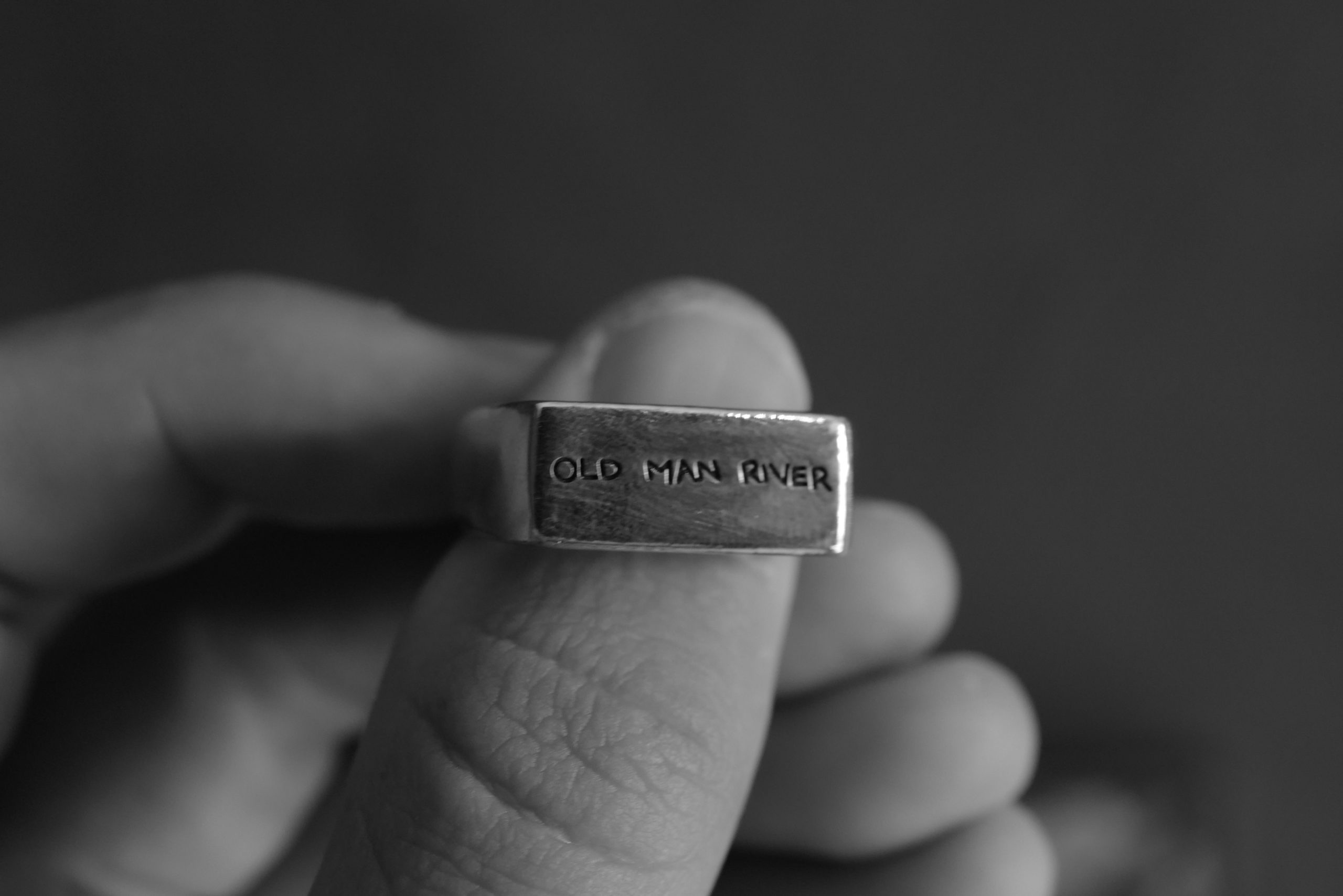
Photo courtesy of Sam Corlett. Ring designed by Sam Corlett, made by Sue the Boy @suetheboy.
ELORDI: Get the fuck out of here.
CORLETT: Yeah, I made one for both of us.
ELORDI: That is so beautiful. I was literally going to get that tattooed on my skin.
CORLETT: I know!
ELORDI: That’s gorgeous mate. It lives on forever. That’s the same font too.
CORLETT: Yeah if you look at the little—
ELORDI: That picture is so soulful. What a great place to start this conversation. Can we give context to that?
CORLETT: Yeah, let’s.
ELORDI: Let’s give context first, and then I’ve got some questions for you. I’ve never interviewed someone before, so we’ll just have a conversation. We can have conversations for hours, you know that. So I the context is Heath Ledger—arguably one of the greatest actors ever. Sam has made me a ring that says “old man river,” which is a tattoo, based on a poem, that Heath Ledger had on his arm. Incredible. So, that’s an interesting place to start. How does someone like Heath Ledger make you feel as an artist from Australia? For me, he plays a massive part of informing what I do. You always say something to me when we talk about curiosity. That’s another thing that I pinched from him, from his interviews: this abundant curiosity. What does that mean to you, and how does that fuel your work?
CORLETT: I think, for a lot of young Aussie actors, or even artists in general, he represents a sense of constantly diving into the mystery of life, what it means to be human, and the beauty of expressing that. He was so excited by his creativity, so eager to gift it to the world, and sharing his discoveries in the moment.
ELORDI: Yeah.
CORLETT: Also, you know, his life was shorter than most. It brings a sense of gratitude for what we get to do, I don’t know, with the hope of continuing his song, his lineage, his expression through our expressions, and attempting to honor who came before us.
ELORDI: That’s interesting you say that, because that speaks to the camaraderie of being Australian and being an artist in Australia. We met serendipitously through the work, but the feeling I had when I first met you wasn’t a feeling of making a friend, or like, “Oh will I like this guy? Won’t I like this guy?” I think that has to do with Heath Ledger, and what you’re talking about—continuing that lineage. Here’s a soldier who’s on the same journey that I’m on, to further this idea of truth and honesty. Meeting you, I was like, “Oh great, here’s someone who’s drinking from the same fountain. Let’s keep walking together.”
CORLETT: Yeah man, and every facet of your success excites the hell out of me. I’m always super stoked to see what’s next for you and to watch you perform. You operate at a level of excellence and, similar to my feelings when I watch Heath, I feel inspired by your art.
ELORDI: Oh well, I felt the same thing last night watching you play Leif. First of all, unbelievably cool. Like, you’re a fucking Viking! I was watching it the other day, and I said, “Look at Sam.” And everyone was like, “Where’s Sam?” I was like, “He’s the fucking massive guy with the beard.” You just completely transformed, and one of the ways that you transformed is, Leif is so stoic. He’s a watcher with this fierce intensity, but it’s almost whimsical, like he’s joking the whole time. He’s capable of this great violence, like when he just stabs that guy in the stomach, but then, there are so many elements of you in there. And you’re so gentle and soft and kind and open. Did you deliberately keep those parts of you when you were building the character? Or, is it impossible for you to do otherwise? Do we ever shed all of ourselves when we play a character?
CORLETT: For me, diving into a character’s childhood is always the first port of call, and that’s like his innocence. He’s traveling all over the world, he’s the son of one of the most notoriously violent Vikings, Eric the Red. The main thing I was marinating on was, what is it like to grow up in a household where that’s the case, and to witness your dad being exiled for wrongdoings? And then, what’s it like to become the leader of this commune and household? So I think…sorry, I just need to think about that for a second.
ELORDI: No, of course. Take your time.
CORLETT: Yeah, my mom had a pretty rough upbringing, and I witnessed the effect of an alcohol-fueled raging father, and the effect that had on my mother and my uncle. She so badly wanted to give me the opposite upbringing. So, that played into it. It was very much like, what would it be like to witness your father do such violent acts? And to be associated with those atrocities wherever you go in the world? I think there’s a great yearning for liberation there.
ELORDI: I think that personal thing is interesting, about your mom’s experience. It’s funny, because that’s not firsthand experience for you, but you’re obviously empathetic to the cause because you were raised by her.
CORLETT: Yeah.
ELORDI: Do you need to draw from the experience that you know? I know where I stand on it, but how was that process for you? Because, it’s also a period piece. That’s very hard [because] you have no idea what it was like to be chased down by armies of men with axes.
CORLETT: Sincerely, I think, no matter what route you choose, you’re drawing upon your experiences, and that can be an empathetic experience. That can be witnessing atrocities that are happening around the world and feeling that sense of injustice and wanting to alchemize that pain. One thing that I do is say to myself before every take, “I welcome anything and everything that helps serve this moment, right here, right now.”
ELORDI: Do you find that costs you anything?
CORLETT: I look at every experience in my life as a gift. I feel like I’m paying tribute to it. Therefore, it doesn’t feel like it’s using me. It feels like these experiences come to me.
ELORDI: That sounds so healthy. Just stepping back a little bit, because I feel like this is something that doesn’t often get asked—you’re on this crazy, crazy journey. The other day, I’m driving down Sunset Boulevard, and I see my brother Sam carrying an axe on a billboard. It’s incredible. I’m watching these trailers online along with thousands, millions of other people watching you covered in blood screaming. It’s this astronomical rise. How are you doing? You’ve been in L.A. the last couple of months. This is probably the most time you spent in the city. Are you feeling okay? 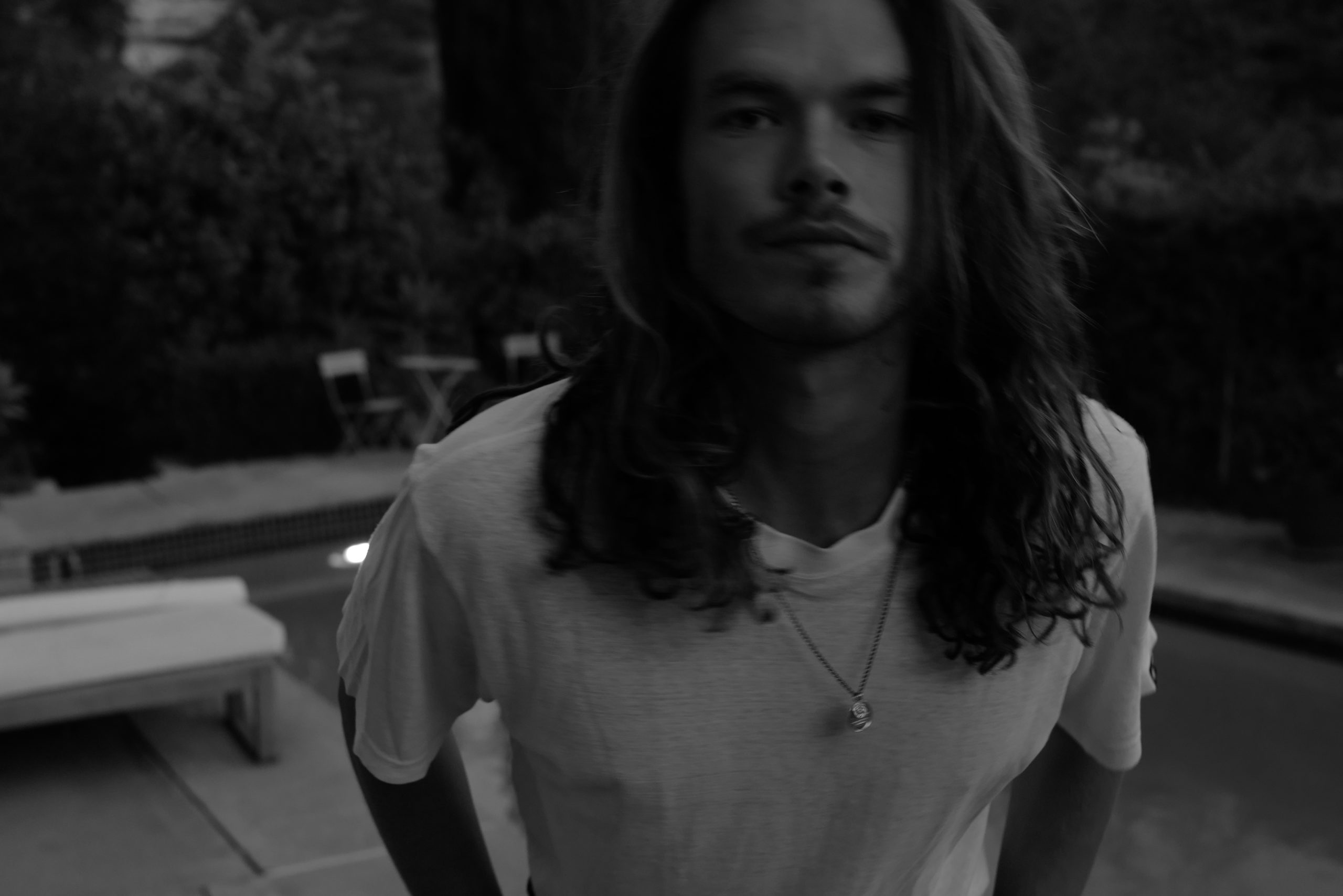
CORLETT: Being on set was the top of the mountain. I can’t—I don’t know. It doesn’t even feel real. I woke up and it happened to be that the billboard outside my window at The Edition was changed to the Vikings poster and I…like my mind can’t comprehend that that’s me, or that it’s happening. I’ve had this vision for so long that it’s just like, “Oh yeah, sure. That’s just part of the flow.”
ELORDI: Can you liken the two experiences? The high you have when you’re on set and doing what you trained to do, and this sort of beginning of success? Are they similar feelings, or entirely separate?
CORLETT: Well, the show isn’t coming out for another four days.
ELORDI: But your face is floating above the road! You know what I mean? That’s not normal.
CORLETT: No, it’s not, and it doesn’t feel normal. I think, like you were saying, it almost doesn’t look like me, so it doesn’t feel like me up there. I’m like, “Oh that’s Leif up there. I’m still down here.”
ELORDI: That’s very interesting. So, you’ve known this group a long time, and you grew very close on set. What was the collaboration process like?
CORLETT: One of my first conversations with Jeb Stuart, we went deep into the heart, into family. We were very aligned about what Leif could represent. I’d always suggest scenes and memories and backstories, and I was always happy to kill my darlings. But luckily, a lot of my thoughts were taken on board, and that was really cool. Unfortunately, we had lockdown for four months prior to shooting, but that was kind of to our benefit, because we got to chat so much and play with the scripts and edit it a fair bit. In regards to the tattoos, it was cool, I think. As one of the leads, you’re heard a bit more. There’s a Rumi quote that says something like, “Seek the path that demands of your whole being.” I was just yearning to be demanded of, all of myself. So, as soon as I started speaking with the makeup artist, I started sending in tattoo ideas and then I started drawing my own and sending the designs to them. That was really cool, and that was taken on board. Then, also like the costume…I’m not sure. You probably didn’t get to see episode eight yet. I haven’t seen it.
ELORDI: No, I haven’t. Do you have it?
CORLETT: I haven’t got it.
ELORDI: I’ve got all your episodes.
CORLETT: The armor at the end, it’s vegan leather, and Susan Cave was able to make that for us.
ELORDI: That’s so interesting.
CORLETT: Initially, one thing in the script I wanted to adjust was that I felt like Leif was probably speaking a little too much.
ELORDI: That tracks, because he’s just a watcher. It’s so compelling. You’re always wondering, “Where is he? At the back of the room? What’s he gonna do?” It’s so uncomfortable. I love it.
CORLETT: Yeah, and it was good to enhance the role of the family that came over with him, because then as they pass on—I don’t know if I can articulate it so well. As they die, a part of him dies as well.
ELORDI: He’s also on this pilgrimage for his family, so to have them run the narrative and have him be this savior looking on is really beautiful. You’re talking about your input on the costume and the drawing the tattoos, is that a part of your process? Do you listen to music or read any poetry that informs the character?
CORLETT: I definitely have certain playlists for certain moments.
ELORDI: Give the people what they want. What did you listen to, in particular, for Leif?
CORLETT: Well, a lot of soundtracks of some similar films, and then also some really grungy rock and roll and hip-hop to try to get into that more physical atmosphere. “Primal” was the word that I wrote all the time, and that contributed to how I operated every day. I’d wake up, do my meditation, and then I go for a 7-K run and jump in the ocean. I get so in touch with nature and the world around me, and then it was just being extremely militant. I really welcomed animal work as well, like the idea of a lion and a wolf existing within him, the lion being the more noble aspects and the wolf—
ELORDI: You can see it. One thing I wrote down was that he seems starved a lot of the time, like he’s deeply hungry. And you know who had the exact same look in his eye, was…Why am I blanking on his name from Vikings? Travis [Fimmel]. He has this lightness on his feet, but he’s also devilishly hungry and in need of something. Did you speak to him at all?
CORLETT: A few of the boys messaged us. Travis messaged us. Alexander Ludwig messaged us, Jordan [Patrick-Smith].
ELORDI: Unreal.
CORLETT: That was really nice. I used to watch the show with my dad, and Travis’s performance is so enigmatic. There’s such a danger there that’s so attractive. We are set 150 years later, and so there were certain behavioral aspects that I wanted to welcome from the original but, ultimately, we’re doing a new show and it’s important to bring some freshness as well. Travis is so Australian, like I think the most I’ve ever experienced.
ELORDI: I’ve seen some hilarious interviews. So you were talking about going for runs and stuff before work. All my questions are acting questions, but I’m genuinely intrigued—How much did Ireland, and your situation in lockdown, play a part in your experience? Did you learn anything about the character while you were living there? I know you were telling me you found a kind of family there.
CORLETT: I mean, a lot of us Aussies have heritage there, so it was really cool to be in that land. My grandfather was from the Isle of Man, which is not too far away and so I could feel his energy and his spirit. The Celtic mysticism that’s there is really beautiful. That still exists in people today, whether that takes the form of a group of hooligans who swim every morning in the ocean, or whatever.
ELORDI: These were real people that you chanced upon?
CORTLETT: I went for a little meditation and a swim one morning, and I happened to run into some people who were coming out of the ocean. They said, “We come every morning at sunrise and have a swim in the ocean.” I was like, “Every morning??” And they were like, “Every morning.” So I came down the next day, and there were literally 150 people swimming in the ocean. The Irish fucking ocean! It’s like three degrees, and they’re just celebrating life before the day even starts.
ELORDI: There’s a philosophy behind them swimming?
CORLETT: Well, cold exposure and all that stuff. But, community was the main thing. I certainly felt fucking alone over there at times, and that was pretty rough. I’d never experienced homesickness, especially with not being able to properly hold people or have any sense of human contact. I’d come home from set some days and literally crawl up the stairs and cry. And I’ve never had that before in my life.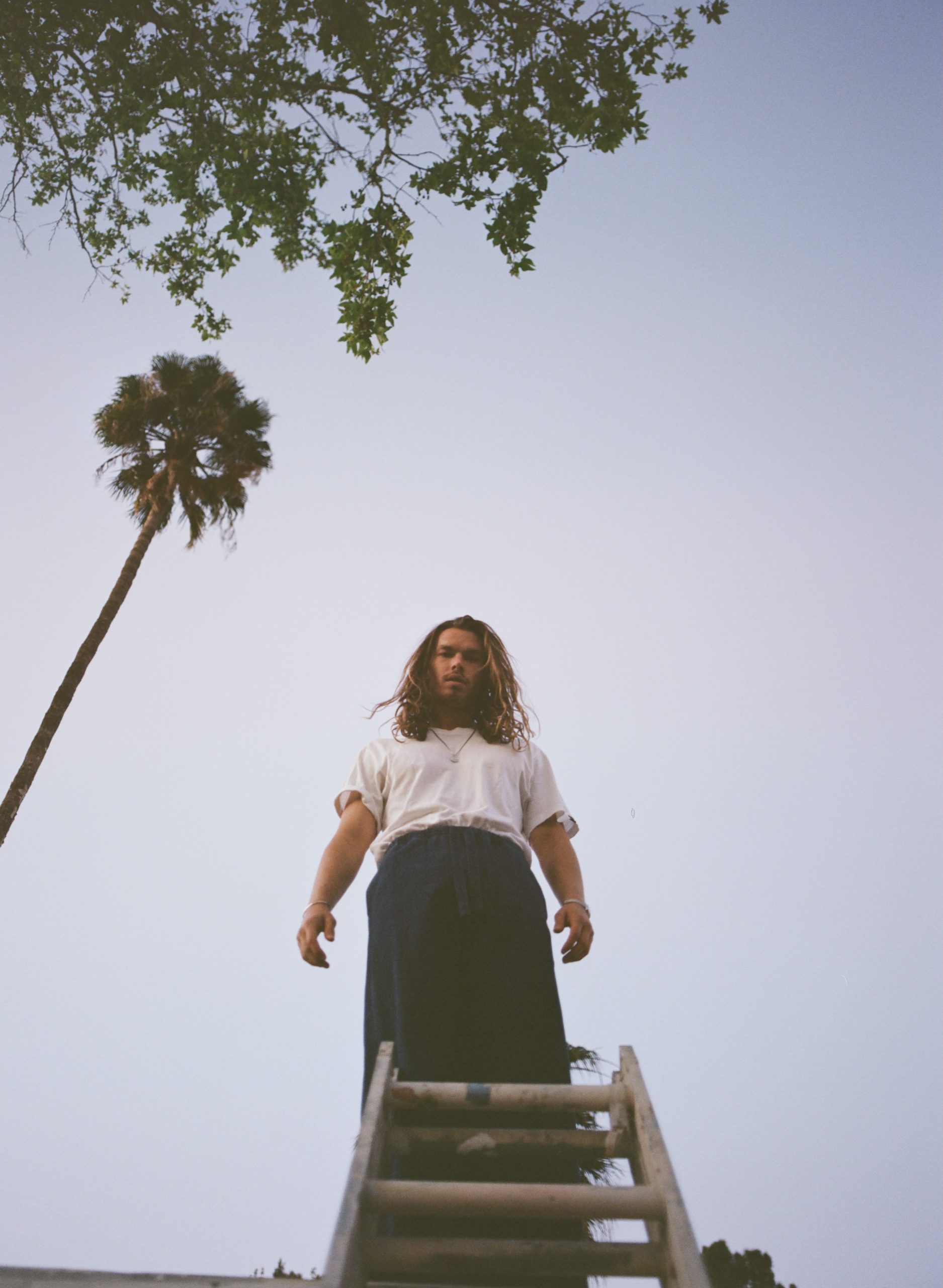
ELORDI: You can have people around and still feel that way, when you’re abroad. Jack Kerouac has this quote that’s like, “I’m screaming for someone that’s known me for more than five minutes.” You can still feel lonely with new people around because you need that home base.
CORLETT: For sure. But then I came across this group of Irish folk and two of them became my best mates. I wrote a poem for one of their weddings. I was doing the maintenance in their gardens on the weekends. There was also this one lady, Linda, a 72-year-old, ex-Catholic nun, lesbian lady who still sends me quotes from John O’Donohue, an Irish poet, every day. That was beautiful.
ELORDI: These people were really alive.
CORLETT: Yeah, they are.
ELORDI: That’s magic. That’s so much better than sitting in an apartment or a hotel room, which I feel like most of us do for five months on location, just withering away.
CORLETT: Man, definitely. I was like, although this is fucking shit at times, it’s actually helping me on set. But when you’re doing it for like six to eight months, you need a release.
ELORDI: It’s just hell. Like, you cannot sit in a space of that much discomfort for that long.
CORLETT: It doesn’t serve the art.
ELORDI: Okay, so, after Vikings…I don’t want to ask a question as stupid as, “Where to from here?” But I know you’re a man with a lot of dreams, and you have a plan of who you want to be and what you want to do. What do you want to do? Who do you want to be?
CORLETT: That keeps on changing. I used to be full into goal setting, but now. I almost just want to pick three feelings like love, fulfillment, and joy, and take steps each fucking moment towards those three feelings. That’s all I want to think about, because if you go too objective with it, you’re not actually fucking present for the amazing experience that you could be having right here, right now.
ELORDI: Absolutely. Mads Mikkelsen said, “Every job is the most important job in the world, because it could be my last one.”
CORLETT: I find a lot of actors our age struggle with that. It’s almost like the current job is an advertisement for the next job. Sam Rockwell says as well, “I treat every role like it’s Hamlet. I’m going to give it my all, and honor the story for the story’s sake.”
ELORDI: What do you want at the end of it all?
CORLETT: I want money and fame.
ELORDI: Yeah baby! That’s what I was looking for!
CORLETT: [Laughs] I just want to be fucking happy. I just trust the flow.
ELORDI: I feel like you live and die by meditation. Truly, I’ve never met a man that’s inspired me more to want to take a breath, so that’s incredibly admirable.
CORLETT: Meditation means a lot to me.
ELORDI: Let’s talk about that. Has that always been the case, or is it something that you found during the work?
CORLETT: I found that growing up. My mom battled cancer three times through my childhood. The first time was when I was 12 or something, then she got really into The Secret and The 7 Habits of Highly Effective People, and got me the teenage versions. When I was 16 she was diagnosed with breast cancer, which was the most hardcore of the three, and she welcomed a lot of so-called “alternative ways of healing.” One of them was meditation. She invited me outside in our backyard to sit with her and I felt a profound sense of unity with all that is, and peace. Because I was just open, as we are when we’re kids, that was such a beautiful experience. From that little glimpse, I started welcoming the practice more and more. I went to a temple just the other day, which I’d love to take you to.
ELORDI: In L.A.?
CORLETT: In L.A.
ELORDI: Oh no.
CORLETT: It’s called Lake Shrine.
ELORDI: It’s called a cult.
CORLETT: No, man. It kind of really changed me. It was the perfect timing for me to experience this.
ELORDI: You’re very good at taking the time for yourself when things are going on. You always come back to the work, to the meditation, to the structure that you have, even when you’re doing press every day. It’s a necessity.
CORLETT: It’s like brushing your teeth, man. Literally just makes sense.
ELORDI: That’s beautiful. I have one last question. Who are you dating? No, I’m just fucking with you.
CORLETT: It’s me, he’s dating me!
ELORDI: Okay, real final question. This one would have meant a lot to me, when I was a kid watching and reading every Australian actor’s interviews ever. I’m sure you were the same. In Australia, it’s like, how the fuck am I going to make movies? How the hell do you do that? What would you offer the young Australian sitting at home, who wants to act?
CORLETT: Hmm.
ELORDI: Tricky one.
CORLETT: I’d prefer to encapsulate the advice in my experience, in what I did. I studied the greats before me. I was driving an hour and a half to and from Sydney to go to my acting classes when I first started. On the drives, I was listening to Inside the Actors Studio, listening to every interview you could think of, and learning all the different pathways into the craft. It’s cool to be aware of how many avenues there are into this work, because there are a plethora, and then to just start taking the steps that you feel intuitively are right for you. So I think, for me, it’s just, “Do the work.”
ELORDI: Do the work. That’s exactly what I had written on my mirror above my bed, and it’s hard to explain because it’s just in your gut. It’s that thing of, “If it’s there, you’ll know.” You’ll watch those movies and you’ll feel it.
CORLETT: If you do the work, it will probably take care of itself, you know? You don’t need to go to the parties. You just need to let the work speak for itself. That’s actually a good line.
ELORDI: If you if you love it, it will be, and then you, too, can be on a billboard be above Sunset Boulevard, wielding an axe and screaming at bumper-to-bumper traffic like Sam Corlett. Mate, you are honestly one of my heroes. Few people make me feel like changing how I think, and you are one of those people.
CORLETT: Likewise, man.
ELORDI: I’m so excited, also terrified, to see everything that comes next for you, and I’m so excited to be nipping at your heels in the years to come, and to be in the theaters watching your characters, and be like, “I’m going to get that fucker on the next one.” I truly am, and this is so beautiful.
CORLETT: I’m so grateful you did this. Like, we never really talk about—
ELORDI: —About the work!
CORLETT: And likewise, man. Your commitment and fucking love and devotion is something that I’ll certainly be taking into my stride as well. Super grateful that our paths crossed on this journey.
ELORDI: I love you man.
CORLETT: I love you too.


